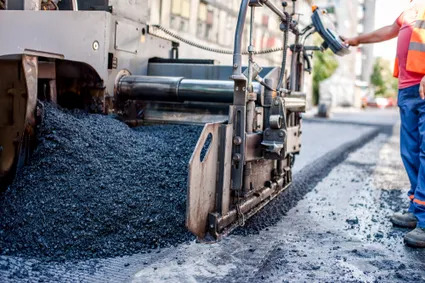Asphalt Calculator
Material Estimate:
Hot Mix Asphalt: tons
Crushed Stone Base: yds³
Estimated Material Cost:
Hot Mix Asphalt: $
Crushed Stone: $
Equipment Rentals & Supplies: $
Estimated Total Cost: $
Installation Overview
Driveway/Lot Area: ft²
Driveway/Lot Perimeter: ft
Table Of Content
- What is asphalt and what is asphalt made of?
- How to determine your asphalt requirement?
- Notes to consider when applying asphalt.
- How much does an asphalt driveway cost.
- Some advantages of using asphalt.
This asphalt calculator determines the amount of asphalt needed for any asphalt highway or airfield project. This calculator can also work as a blacktop calculator, to determine the required asphalt for an asphalt driveway project. You can also use this calculator as an asphalt driveway cost calculator, to help you have an idea how much does an asphalt driveway cost. This calculator can be used for any asphalt project, including the repair of potholes in an asphalt roadway, or any asphalt pavement repair works. If you're planning to make a concrete driveway, you can check our concrete driveway calculator for the materials you'll need for your project. But, if you're really into asphalt, keep reading to learn what asphalt is, what asphalt is made of, as well as the benefits of building an asphalt driveway.
What is asphalt and what is asphalt made of?

But, there’s more!
If you know the price per unit mass/volume of the crushed material, then the calculator can also work out the total cost of the aggregate using the formula:
OR
Of course, you might not know the price per unit mass/volume
If so, then you can calculate this yourself using the formula:
Weight of aggregate
OR
Volume of aggregate
Something not clear? 🤔
See below for three full examples detailing how the calculator gives you the volume, weight & cost.
Otherwise, simply enter your measurements and correct units in the calculator to start your next outdoor construction project efficiently!
Example calculations
Fill a space with concrete (150 lb/ft³)
Let’s say we need to fill in an area of space measuring 5 feet long, 3 feet wide and 2 inches deep with concrete which costs $50 per US short ton.
I want to work out an estimate for the volume of concrete required, how much it will weigh and the total expected cost of the project.
I would enter these measurements into the calculator, which would perform the following operations:
Fill 12 square feet with custom aggregate
For the second example, let’s now say that I have an area of 12 ft² that I want to fill with an aggregate material.
The base is to a depth of 4 inches.
I will use a custom material of unknown density which weighs 200 lb per four cubic feet and costs $60 per US short ton.
First, in order to calculate the material’s density, I would do the following calculation:
Volume
To work out the weight and cost of aggregate, I would need to know the volume, which can be calculated using the formula:
And finally, using the formula:
Laying fresh concrete (150 lb/ft³)
For our final example, let’s say we want to use the calculator to help us with a project where we’re laying down fresh concrete, but this time the area is to be filled with concrete to a depth of 6 inches, with a total cost of $60.
The density of concrete is 150 lb/ft³.
To calculate the weight of the concrete, I would do the following: